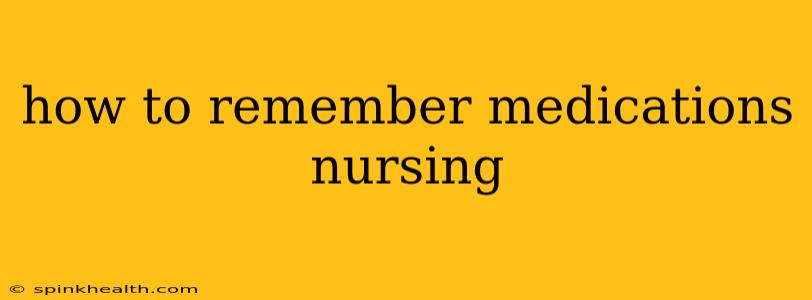How to Remember Medications: A Nurse's Guide to Medication Adherence
For nurses, remembering medications isn't just about personal health; it's about patient safety and the effective delivery of care. The responsibility is immense, and even the most seasoned professionals can sometimes face challenges in remembering medication schedules, dosages, or specific patient needs. This isn't a sign of weakness; it's a shared experience. This guide explores practical strategies and techniques nurses can use to ensure optimal medication adherence, both for themselves and for their patients.
Why is Remembering Medications So Important for Nurses?
Before diving into the techniques, let's underscore the critical importance of medication memory for nurses. A lapse in memory can have severe consequences, ranging from minor medication errors to serious patient harm. Accurate medication administration is a cornerstone of safe patient care, and reliable memory is crucial to this process. For nurses, remembering isn't just about following procedures; it's about making life-or-death decisions. Personal medication adherence is equally vital for maintaining a nurse's own health and well-being, enabling them to provide the best possible care.
What are Some Common Challenges Nurses Face in Remembering Medications?
Long Shifts and Fatigue: Working long, demanding shifts can lead to fatigue and mental exhaustion, impacting memory and concentration.
Multiple Patients: Juggling the needs of numerous patients with varied medication requirements can easily overwhelm even the most organized nurse.
Complex Medication Regimens: Some patients require complex medication schedules with multiple medications, dosages, and administration times.
Stress and Pressure: The high-pressure environment of healthcare can significantly affect cognitive function and memory recall.
Personal Medication Management: Nurses also need to remember their own medications, especially if they manage chronic conditions.
Practical Strategies for Nurses to Improve Medication Memory
1. Utilize Technology: Medication administration apps, digital reminders, and electronic health records (EHRs) can significantly improve accuracy and reduce reliance on memory alone. Many hospital systems utilize barcode scanning to verify medications before administration, reducing the risk of errors.
2. Effective Organization: Keep detailed patient medication lists, utilizing color-coded systems or visual aids to categorize information quickly. This is especially important when dealing with numerous patients and complex medication regimens.
3. Structured Workflows: Develop consistent routines and checklists to streamline medication administration. This reduces the cognitive load and minimizes the chance of errors.
4. Teamwork and Communication: Collaborate closely with colleagues, sharing information and supporting each other in maintaining accurate medication records and procedures. This shared responsibility can prevent individual errors from impacting patient safety.
5. Prioritize Self-Care: Adequate sleep, healthy eating, regular exercise, and stress management techniques are essential for maintaining optimal cognitive function and memory. A well-rested and healthy nurse is better equipped to handle the demands of the job.
6. Medication Reconciliation: Regularly review and update patient medication lists to ensure accuracy and identify any potential discrepancies. This is especially important when patients are transferred between units or facilities.
7. Double-Checking: Always double-check medications before administering them. This extra step can prevent many medication errors.
8. Mental Rehearsal: Before starting a shift, mentally review the medication requirements of key patients. This proactive approach reinforces memory and improves preparedness.
How Can Nurses Remember Their Own Medications?
Nurses, like everyone else, need strategies to remember personal medications. The same techniques mentioned above—using medication apps, setting alarms, and employing visual reminders—can be equally effective. Consider using a pill organizer to simplify daily medication intake. Discuss your medication regimen with a trusted colleague or family member for extra support and accountability.
What if a Nurse Forgets a Medication?
Reporting errors is crucial. Hospitals have robust systems in place for reporting medication errors, and transparency is paramount in preventing future occurrences. Honest self-reporting demonstrates professionalism and commitment to patient safety.
Remembering medications is a complex task demanding constant attention and diligence. By embracing these strategies, nurses can effectively improve their medication memory, ensuring the safe and effective administration of medications to their patients while also prioritizing their personal well-being. It’s about building a culture of safety and accountability—one pill, one patient, one nurse at a time.

